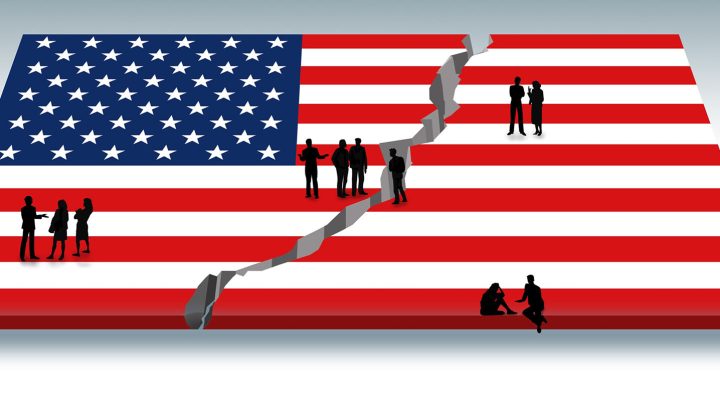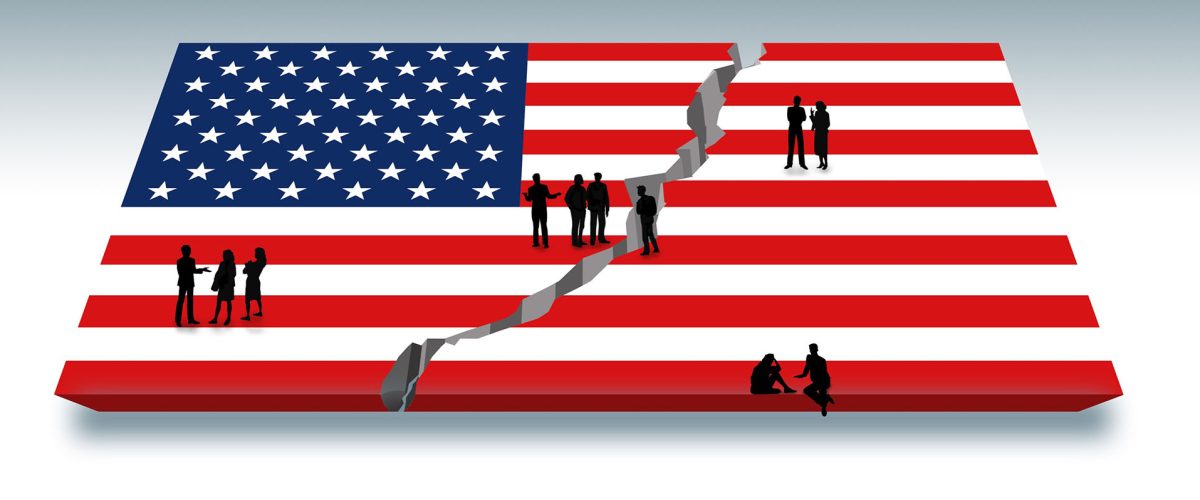Few would be surprised to learn that the latest American Values Survey shows Americans moving increasingly apart on issues such as race, sexuality, politics, immigration, democracy and the overall state and direction of the nation.
Even so, Robert P. Jones, president of Public Religion Research Institute, confessed his astonishment at the depth and breadth of the gulf separating Americans. He spoke during an Oct. 27 release of the national study data.
“As somebody who’s looked at this data for a long time, year after year I’m still continually struck by how — by party, by race, by religion — we are in many ways factions and worlds apart not just politically but culturally, and that we have two political parties essentially defending different histories, living in different realities and even promoting two essentially incompatible views of America,” he said.
Jones shared segments from the 54-page report during a hybrid presentation hosted by PRRI and the Brookings Institution, its partner in the study.
The event, which included a panel discussion among experts in U.S. politics and culture, began with Jones describing some of the key responses from 2,500 American adults surveyed Sept. 1-11. “It’s actually kind of eye-popping to see just how big some of the gaps are on some of these issues,” he said.
Going in the wrong direction?
Among the biggest surprises came when respondents were asked if the nation is “going in the wrong direction” and if “American culture and way of life” had changed mostly for the worse since the 1950s.
“Americans are equally divided on the question of whether the country’s culture and way of life have become better (49%) or worse (49%) since the 1950s.”
“Americans are equally divided on the question of whether the country’s culture and way of life have become better (49%) or worse (49%) since the 1950s,” the survey found. “Those who are most likely to say the country is moving in the wrong direction are also most likely to say things have gotten worse since the 1950s. Two-thirds of Republicans (66%) believe things have changed for the worse since the 1950s, compared with half of independents (50%) and only 30% of Democrats.”
The breakdown by religion also is telling, with 93% of white evangelical Protestants saying the nation is headed in the wrong direction and 71% saying the country has changed mostly for the worse since the 1950s. White Catholics (81%, 53%), white mainline Protestants (76%, 51%) and “other” Christians (75%, 57%) were next in line.
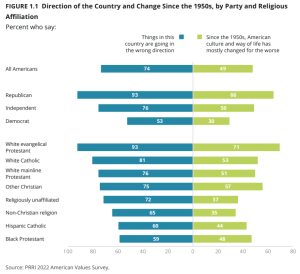
“Less than half of Black Protestants (48%), Hispanic Catholics (44%), religiously unaffiliated Americans (37%) and non-Christian religious Americans (35%) say things have gotten worse since the 1950s,” according to the survey.
American exceptionalism
Researchers also asked participants if they agreed with the statement, “God intended America to be a new promised land where European Christians could create a society that could be an example to the rest of the world.”
Jones said the question was designed to provide insight into the rise of Christian nationalism, a movement based partially on the belief that the United States should be a “Christian nation.”
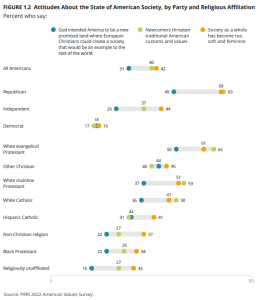
According to the survey, only three in 10 Americans agreed with the statement, including 49% of Republicans, 26% of independents and 18% of Democrats.
“Half of white evangelical Protestants agree (50%), but other white Christians are less likely to do so: 37% of white mainline Protestants and 36% of white Catholics say God intended America to be a new promised land,” PRRI reported. “Forty-four percent of other Christians and 32% of Hispanic Catholics agree with the statement, as do one in five Black Protestants (22%), non-Christian religious Americans (22%), and religiously unaffiliated Americans (16%). About one-third of white Americans (32%) and multiracial or other-race Americans (33%) agree with this statement, as do 29% of Hispanic Americans and 23% of Black Americans.”
Disdain for newcomers
Questions about immigrants and gender were included to further gauge American views on the state of U.S. culture.
The survey found four in 10 respondents agreed that “the growing number of newcomers from other countries threatens traditional American customs and values,” compared with 55% who say it strengthens American society, the study found. That view described 69% of Republicans, 37% of independents and 17% of Democrats.
“White Christian subgroups are significantly more likely than other Americans to perceive newcomers as a threat.”
Religious identity also determined responses to the statement. “White Christian subgroups are significantly more likely than other Americans to perceive newcomers as a threat. Nearly two-thirds of white evangelical Protestants (65%) say newcomers are a threat, as do a slim majority of white mainline Protestants (53%) and half of white Catholics (50%). Four in ten other Christians (40%) say the same, along with less than one-third of Hispanic Catholics (31%), Black Protestants (29%), non-Christian religious Americans (27%), and religiously unaffiliated Americans (27%).”
Is society ‘too soft and feminine’?
Americans also are greatly divided on whether U.S. society “has become too soft and feminine,” PRRI reported. While 53% of Americans overall disagreed with that statement, the partisan and religious divisions, once again, are glaring.
“Approximately two-thirds of Republicans (68%) say society has become too soft and feminine, compared with 44% of independents and less than one in five Democrats (19%),” according to the study. “Six in 10 white evangelical Protestants (61%) agree that society has become too soft and feminine, as do a slim majority of white mainline Protestants (51%), 47% of white Catholics, and 46% of other Christians. About four in 10 Hispanic Catholics (41%) agree, as do 37% of non-Christian religious Americans, 34% of Black Protestants, and 33% of religiously unaffiliated Americans.”
More agreement on LGBTQ rights
Americans generally agreed, however, about LGBTQ rights, PRRI reported. “About three in four Americans (76%) favor laws that would protect gay, lesbian, bisexual and transgender people against discrimination in jobs, public accommodations and housing, including 47% who strongly support such protections.”
Majorities of Republicans (63%) and white evangelical Protestants (60%) also favor such protections.
But that agreement dissolved when respondents were asked about gender identity: “A majority of Americans (62%) believe that there are only two genders (male and female), including 44% who feel strongly that this is the case and an additional 18% who do not feel strongly about it. More than one-third of Americans (35%) say there is a range of genders, including 22% who think this but do not feel strongly about it and 13% who feel strongly.”
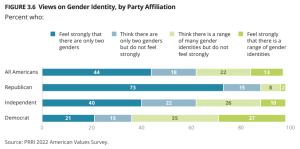
QAnon still influential
Jones said he was astounded by responses to survey questions about rising acceptance of QAnon conspiracy theories. PRRI researchers included a question about whether people believe that there is “a group of Satan-worshipping pedophiles that are controlling the government.”
And, it turns out, 17% of Americans agree with that QAnon belief, while 25% believe “a storm is coming to restore rightful leaders” to national power and 19% hold that “true American patriots may have to resort to violence in order to save the country.”
The proportion of respondents qualifying as QAnon believers has increased by 5 percentage points and the number of QAnon rejecters dropping by 10 percentage points.
“Remarkably, PRRI data show that the proportion of respondents qualifying as QAnon believers has increased by 5 percentage points and the number of QAnon rejecters dropping by 10 percentage points since 2021,” the report states.
Mirror views on election integrity
Americans appear to be largely in agreement in their concern for the integrity for U.S. elections, but they disagree on how to define that concern.
The survey explains that “among Republicans who say the health of our democracy is a critical issue, 86% say the bigger voting problem today is ineligible voters casting votes. By contrast, 89% of Democrats who say the health of our democracy is a critical issue say legitimate voters being denied the right to vote is the bigger problem.”
“They are literally mirror images of each other on this question,” Jones explained. “When they say, ‘health of our democracy,’ it’s two different visions of what that means.”
Opposing views on race and slavery
The study also uncovered different views about race, including whether centuries of slavery and discrimination created persistent obstacles for African Americans. A large minority of Americans (45%) agree with that view, compared to 51% who disagree.
“Democrats are much more likely than Republicans to agree (72% vs. 16%), while independents are divided (47% agree and 51% disagree),” PRRI reported. “White Christian subgroups are significantly less likely than other religious groups to agree with this statement. Minorities of white evangelical Protestants (19%), white Catholics (32%), and white mainline Protestants (36%) agree that the legacy of slavery and discrimination have limited Black Americans’ upward mobility. By contrast, majorities of Hispanic Catholics (52%), non-Christian religious Americans (57%), religiously unaffiliated Americans (60%), and Black Protestants (78%) agree with this statement.”
Discouraging findings
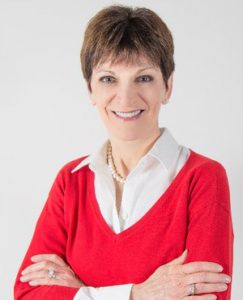
Mona Charen
Panelist Mona Charen said she was largely disheartened by many of the survey’s findings.
“As a former conservative Republican, I am particularly grieved by the dark and suspicious and unwelcoming attitude that has taken hold in my former party,” said Charen, policy editor of The Bulwark and the moderator of the weekly “Beg to Differ” podcast.
“The data about QAnon are just head-spinning,” she added. “The is the sort of distorted thinking we associate with unstable societies. Even as I stare at the numbers, I have trouble assimilating this. A significant share of our fellow citizens are not just angry or alienated, dissatisfied, sour, they are unhinged.”

Janelle Wong
Janelle Wong, a PRRI board member and professor of government at the University of Maryland, said the survey’s findings about LGBTQ protections are, to an extent, a positive.
“LGBTQ rights are complex, and here we see that majorities of people from both parties and all religious groups, including 60% of white evangelical Christians, support protecting LGBTQ rights,” she said. “At the same time … there seems to be some evidence of a ceiling on Republican support for these protections, so we see an increase over time among Democrats but Republicans support seems to have stalled out at around a little over 60%.”
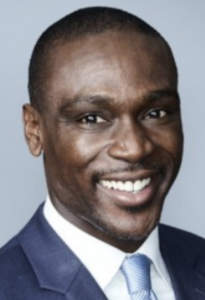
Eugene Scott
Panelist Eugene Scott, a politics reporter for The Washington Post, noted the study reaffirms that Republicans and white evangelicals are not the only “values voters” in the nation. “What we are seeing with this survey and surveys moving forward is that everyone has values.”
And it will be especially interesting to see how those values play out when religiously unaffiliated Americans get to the polls, Scott added. “One of the main reasons this group is so interesting is because we are about to see what values look like for people who do not align with organized religion.”
Related articles:
Most Americans agree democracy is in trouble, but few worry about it

